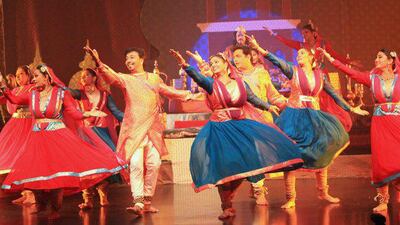The Malhaar Choir will honour a pioneering Indian music legend this week. The Dubai based collective will perform a recital of the Hindi/Urdu dance Haaye Akhtari at the Madinat Theatre on Friday and Saturday in tribute of Begum Akhtar. The legendary Indian ghazal is renowned for swimming against the tide for performing during an era when women were shamed for singing in public. The cultural ministry of India released commemorative coins on her birth centenary last year. The musical draws from the biography Ae Mohabbat ... Reminiscing: Begum Akhtar by Indian vocalist and Akhtar's student Rita Ganguly, and weaves aspects of the Akhtar's life and songs in the 90-minute performance.
Akhtar’s life
Her rags-to-riches story begins in Lucknow when her father’s family disowned her mother and twin, who died at the age of seven.
Akhtar became a courtesan singer, a profession frowned upon by Indian society at the time. She broke away to become one of the first female musicians to give public concerts, most notably a performance for the 1934 Nepal-Bihar earthquake victims which was applauded by social activist and poet Sarojini Naidu. Along with a career in music. Akhtar stared in a few films in the 1930s before taking a hiatus from music in 1945 — only to return four years later. She continued to perform until her death in 1974 -right after a hometown performance in Lucknow.
Director’s cut
Dubai-based playwright and theatre director Sanjiv Dixit says he relied on Ganguly’s anecdotes to write the script. “There is so much conflicting information out there because all these stories are from the people recollecting. But since Ganguly was so close to Akhtar and her husband, we stuck to her narrative,” he says. “Akhtar quit because she got married. She only got back to singing after India got independence. Some people believe the hiatus was because her husband did not allow her to sing. But it was her own decision.” Dixit, who first wrote the script in English before translating it into Urdu, says he took liberties with the chronology of events to set it to Akhtar’s most popular ghazals, which is the mainstay of the play.
The show
More than 50 UAE-based singers, dancers, theatre actors and visual effect artists have been working since July on the tribute. Music director Somdatta Basu said it was challenging to choose the most relevant compositions from Akhtar's vast repertoire. "Malhaar has a unique way of presenting plays that are reliant on a choir and dance," says Basu, a classical singer who trained under the late Indian classical musician Sipra Bose, one of Akhtar's disciples. "Ghazal singing in a choir is a bit difficult, but we have tried our best to improvise without deviating from the original melody and tunes. We've just added a few sargams and taranas (pitch and pace)," she says. Some of the ghazals included in the play are Woh Jo Hum Mein Tum Mein Qarar Tha, Mere Humnafas Mere Humnawa and Koi Yeh Kehde Gulshan Gulshan.
• Haaye Akhtari is at Madinat Theatre, Madinat Jumeirah on September 18 and 19 from 7.30pm. Tickets are from Dh75 on www.madinattheatre.com
aahmed@thenational.ae

